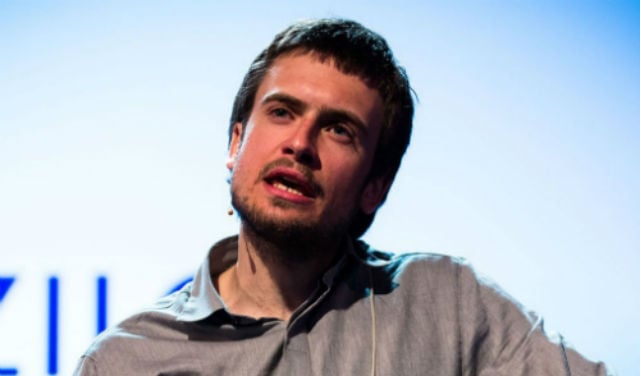BERLIN
Pussy Riot activist in Berlin hospital after suspected poisoning
A member of the Russian punk band Pussy Riot was flown to a Berlin hospital overnight after a suspected poisoning, with his estranged wife saying on Sunday it may have been attempted murder.
Published: 16 September 2018 16:18 CEST

Pyotr Verzilov is still experiencing hallucinations and delirium. Photo: Oslo Freedom Forum
Pyotr Verzilov, who has both Canadian and Russian citizenship, was admitted to a clinic in Moscow on Tuesday after falling ill following a court hearing.
Described by staff as being in “serious” condition, the 30-year-old was initially treated in intensive care and later regained consciousness. He was, however, still experiencing hallucinations and delirium, his girlfriend told Russian media on Friday.
Late on Saturday, he was flown to Germany aboard a medical helicopter chartered by the Cinema for Peace Foundation, an NGO which has long supported the band's activism.
On arrival, he was met by his wife, Pussy Riot's Nadezhda Tolokonnikova, from whom he is separated. She told a German newspaper the poisoning may have been an attempt to kill him.
She assumed “that he was the victim of either an act of intimidation or attempted murder,” the Sunday edition of Bild quoted her as saying.
Speaking to a Russian website on Friday, his girlfriend Veronika Nikulshina, also a Pussy Riot activist, said it was “definitely poisoning”.
She said he had been administered a “large dose” of anti-cholinergic drugs, which are used to treat a range of issues including lung conditions. His family said he was not on any medication.
Testing for poison
The allegations of foul play come as the investigation of the poisoning of Russian double agent Sergei Skripal and his daughter in Britain gathers pace.
Verzilov's collapse on Tuesday came after he and Nikulshina had served a 15-day jail sentence along with two other Pussy Riot members for invading the pitch during the World Cup final in July to highlight Russian police abuses.
Jaka Bizilj, who chairs the Cinema for Peace Foundation, said the NGO had urgently despatched an air ambulance to bring him to Berlin to run tests.
“It was important for the family that he be hospitalised as quickly as possible outside of Russia,” he told Bild. “We hope it will be possible in Berlin to quickly help him and see if he was poisoned in Russia, and how,” he added.
Bizilj said in a statement sent to AFP that he suspected the “attack” on Verzilov was “revenge for appearing in the World Cup final to support human rights in Russia”.
He included several photos of Verzilov arriving in Berlin on a stretcher. The German foreign ministry was in contact with the hospital where Verzilov was being treated but his evacuation was privately organised.
Another Pussy Riot member Maria Alyokhina told RIA Novosti state news agency that Tolokonnikova had also been involved in organising the airlift.
“They found a doctor there, he will give a diagnosis and treat him,” she said.
Writing on Facebook, his girlfriend Nikulshina expressed relief he had been transferred out of Russia.
“Three times hurrah to everyone who wrote, phoned, visited, cried and sang: we're in Berlin. All is well,” she wrote.
The case comes as relations between Russia and the West have been severely strained over the Skripal attack. The British government accuses two Russian agents of the attempted assassination.
Moscow dismisses the allegations and the two men, Alexander Petrov and Ruslan Boshirov, have said they were tourists who were in Salisbury by coincidence the day of the poisoning.
Url copied to clipboard!


 Please whitelist us to continue reading.
Please whitelist us to continue reading.
Member comments